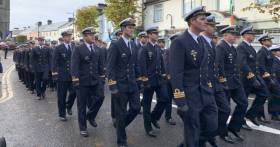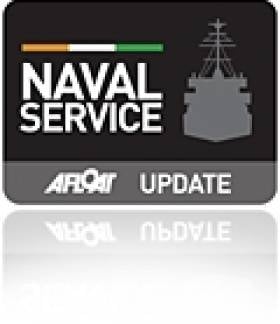Displaying items by tag: Foxford Co Mayo
Officers from Argentinian Navy in Mayo Honour Founder Admiral Brown
Around 200 Argentinian military personnel reports RTE, travelled to Co Mayo to visit the town where the founder of the country's Navy was born.
Admiral William Brown hailed from Foxford and today’s (yesterday) trip was the largest to take place by officers from the Navy he led.
The visiting party was joined by members of the Irish Naval Service for the ceremonies.
The event also attracted many Argentinians living in Ireland, keen to meet up with their compatriots.
The Naval officers attended a memorial mass in the local church before continuing a parade through the town.
As Afloat previously reported the ARA Libertad is the sail training vessel of the Argentinian Navy which visited Dublin Port at the weekend. The five-day visit ends tomorrow afternoon.
More here on the visit to Foxford.
Admiral Brown's Mayo Naval Connections
#ADMIRAL BROWN – In addition to the 155th anniversary commemoration of the death of Admiral William Brown which was held in the Argentinian capital at the weekend, as previously reported on Afloat.ie, a second ceremony was held in Foxford, Co. Mayo, the birthplace of the admiral who founded the navy of the South American country.
In attendance were the Argentine Ambassador, Dr. Maria Bondanza, with Argentine Naval Attache, Group Captain Alejandro Amoros, and Irish Naval Service Commodore, Mark Mellett. For more about this story as reported by MayoToday click HERE.
Commodore Mellett who also hails from Co. Mayo was appointed Flag Officer Commanding the Naval Service (FOCNS) following the retirement of Commodore Frank Lynch in December 2010.
The Mayo native will be addressing delegates this Friday at the inaugural IMERC Conference on Maritime Geostrategic Thinking for Ireland at the National Maritime College of Ireland (NMCI) in Ringaskiddy.
IMERC which stands for the Irish Maritime and Energy Resource Cluster will host the conference in the college where guided tours of the facility will also be made available during the one-day conference. The conference is open to the public and free of charge, for more information including conference agenda click HERE.






























































